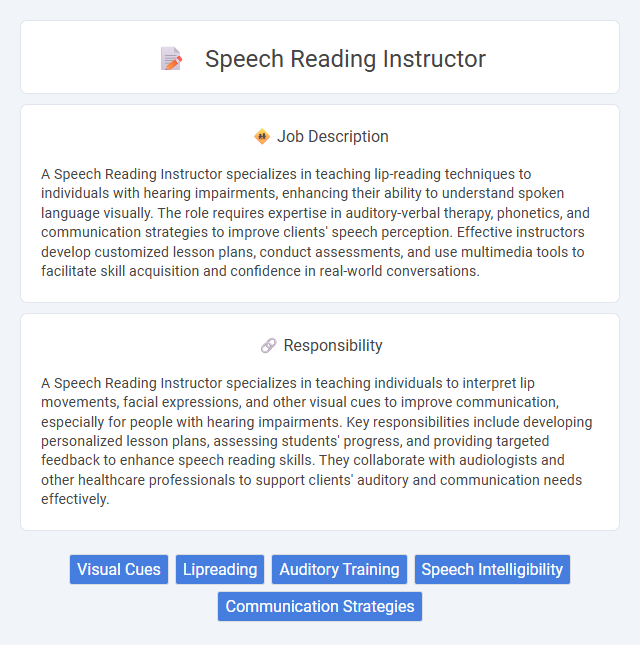
A Speech Reading Instructor specializes in teaching lip-reading techniques to individuals with hearing impairments, enhancing their ability to understand spoken language visually. The role requires expertise in auditory-verbal therapy, phonetics, and communication strategies to improve clients' speech perception. Effective instructors develop customized lesson plans, conduct assessments, and use multimedia tools to facilitate skill acquisition and confidence in real-world conversations.
People with strong auditory perception and patience are likely to thrive as speech reading instructors, given the role's demand for interpreting subtle lip movements and facial expressions. Those who are comfortable engaging with individuals experiencing hearing impairments or speech difficulties will probably find this career fulfilling. Candidates lacking empathy or the ability to maintain focus during repetitive sessions may not suit this job well.
Qualification
A Speech Reading Instructor typically holds a degree in speech-language pathology, audiology, or a related field, often accompanied by specialized certification in speechreading or lipreading techniques. Proficiency in communication strategies for individuals with hearing impairments and experience in auditory training programs are essential qualifications. Strong interpersonal skills and the ability to develop customized instructional plans improve the effectiveness of speechreading training.
Responsibility
A Speech Reading Instructor specializes in teaching individuals to interpret lip movements, facial expressions, and other visual cues to improve communication, especially for people with hearing impairments. Key responsibilities include developing personalized lesson plans, assessing students' progress, and providing targeted feedback to enhance speech reading skills. They collaborate with audiologists and other healthcare professionals to support clients' auditory and communication needs effectively.
Benefit
A Speech Reading Instructor likely enhances communication skills for individuals with hearing impairments, improving their confidence and social interactions. There is a strong probability that this role contributes to better lip-reading abilities, which aids in everyday conversations and reduces communication barriers. The job may also offer personal fulfillment through empowering others to connect more effectively with their environment.
Challenge
Speech reading instructors likely face the challenge of adapting teaching methods to diverse learning styles and varying degrees of hearing impairment. They may need to develop innovative strategies to maintain student engagement and ensure effective communication skill acquisition. Overcoming these obstacles probably requires a combination of patience, creativity, and specialized knowledge in audiology and linguistics.
Career Advancement
A Speech Reading Instructor role offers significant career advancement opportunities through specialization in audiology, speech pathology, or deaf education. Mastery in speechreading techniques enhances prospects for leadership positions within educational institutions or rehabilitation centers. Ongoing professional development and certification in communication disorders contribute to increased earning potential and industry recognition.
Key Terms
Visual Cues
Speech reading instructors specialize in teaching individuals how to effectively interpret visual cues such as lip movements, facial expressions, and gestures to enhance communication. Mastery of visual speech cues significantly improves understanding for people with hearing loss, making it easier to follow conversations in noisy environments or when auditory signals are unclear. Their expertise in combining these visual elements with residual hearing creates a comprehensive approach to speech comprehension.
Lipreading
A Speech Reading Instructor specializes in teaching lipreading techniques to enhance communication for individuals with hearing impairments. They develop personalized training programs that focus on recognizing visual speech cues, facial expressions, and mouth movements. Expertise in phonetics and auditory processing enhances their ability to improve clients' speech comprehension and conversational skills.
Auditory Training
Speech reading instructors specialize in auditory training techniques to enhance individuals' ability to interpret spoken language through visual cues. They implement tailored exercises that improve lip-reading, facial expression recognition, and contextual auditory processing, crucial for those with hearing impairments. Expertise in phonetics and cognitive auditory processing supports effective speech perception and communication skills development.
Speech Intelligibility
A Speech Reading Instructor specializes in enhancing speech intelligibility by teaching individuals to interpret visual cues such as lip movements, facial expressions, and gestures. This role supports people with hearing impairments in improving communication effectiveness through tailored training programs. Speech intelligibility improvements contribute significantly to greater social integration and reduced communication barriers.
Communication Strategies
A Speech Reading Instructor develops tailored communication strategies that enhance lip-reading and non-verbal cue recognition for individuals with hearing impairments. These professionals employ techniques such as contextual analysis and visual speech patterns to improve participants' conversational comprehension in diverse environments. Mastery in communication strategies ensures clients gain confidence and autonomy in daily interactions.
 kuljobs.com
kuljobs.com